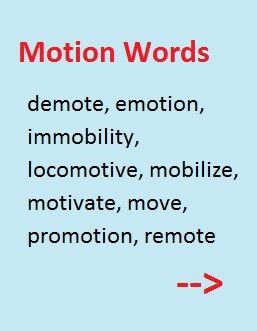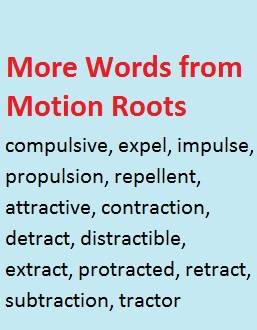English Words from 6 Latin Verbs of Motion
Learn these 6 Latin verbs of motion to help you recognize over 100 useful English words. Think
· flect or flex= bend: flexible, reflection (bending light back),
· tend= stretch: extend and extensive, intense, tension, tendency
· mov, mob, or mot= move: motion, mobile or immobilize, motivate, emotion, demote, promote, remote, removed
· pel or pulse= drive/driven: compelling or compulsive, impel or impulsive, expel, propel, repel
· press= push: express, expression, & expressive, repress, impress, depress, pressure
· tract= pull: attraction, extract, retract, traction, tractor
See each word below for more examples and explanations. Then try the matching exercise to see how many words you can recognize and match to their meanings.
Flectere (-flect/flex)-- to bend:
- Bending our arms or legs causes us to flex our muscles.
- Lots of movement and exercise helps keep us flexible—able to move freely.
- Soldiers in the Greek and Roman armies used shields to deflect arrows or other weapons. The shields bent the course of the arrows away from the body.
- An inflection is a change in the form or meaning of a word as affixes are added. Deflect, flexible, and reflex (as well as the other words below) are all inflections of ‘flex.'
- Reflections are images that look like the things they reflect. For example, when we look at a quiet lake, we can see a reflection of the mountains around it. Reflections are caused by light being deflected or bent back from a very smooth surface like calm water or a mirror. To reflect is to reproduce that image. It can also be to think over what has happened. (“As he reflected on the events of the last year, he realized his attitudes had changed completely.”)
- A reflex is an automatic muscle response like jerking our hand away from a hot stove before we even feel the pain. A doctor tests reflexes by hitting a point just above the knee. If the lower leg jerks up, your reflexes are good.
Other inflections of flectere: flexibility, flexion, inflect, inflected, inflexible, inflexibility, reflect, reflective.
Movere- to move; (past participle: motivus), mobilis- moveable:

- Motion is movement.
- We often say something ‘moves’ us when it touches our heart (affects our emotions.)
- Something that ‘motivates’ us makes us want to do something-- moves us to action.
- Commotion is a lot of movement with noise and confusion.
- To demote someone is to move him down in rank; the opposite of ‘promote.’
- To mobilize an army is to prepare it to move.
- When someone breaks a leg, the doctors immobilize it to help it heal.
- A remote location is far removed from city life and business.
(Other inflections of movere: demobilize, demotion, emotional, immobile, immobility, mobility, mobilize, motive, moving, promotion, and remove.)
Pellere- to drive; pulsum- driven:
- To compel someone is to drive (force) him or her to take action.
- To dispel is to drive away or eliminate clouds, darkness, or negative feelings. For example, "The good news dispelled their anxiety."
- To expel is to drive out. For example, in most of the U.S., schools will expel any student who brings a gun to school. (That means the school will not allow him to attend classes there ever again.)
- An impulse is an urge (within one’s own mind) to do something. Compulsion is similar, but stronger-- a feeling of being driven to do something. An impulsive person often acts on impulses without thinking first.
- Propellers are the turning blades that move a boat or airplane forward.
- Your pulse is the throbbing rhythm you can feel by pressing a spot over an artery. (For example, just below your wrist.) A doctor or nurse will “take your pulse” to learn your pulse rate—the number of heart beats per minute. (Each beat causes the pressure increase you feel in your wrist.)
- To repel is to drive something away. Insect repellant is repulsive to insects like mosquitoes. They don’t want to be around it, so you won’t get bitten (as much!)
More words from pellere: compelling, compulsive, compulsively, expulsion, impel, impulsively, propel, jet propulsion, pulsation.
Pressare- to Push Against or Press
- To compress is to press tightly together. Compression bandages press tightly against a wound.
- A depression can be a severe economic downturn. Depression can also be a condition of (often severe) emotional distress.
- To express is to clearly communicate one’s feelings (push them out toward others). As an adjective, express means unusually fast and direct (delivery, train, etc.)
- Something impressive is noticeable or admirable. “You gave an impressive presentation, even though you had very little time to prepare.”
- Oppression is mistreatment or harsh rule over other people.
- To press is to push something (or someone.) For example, “The employees pressed their secretive boss for information about possible layoffs.” In this case, they had to press rather than just ask because the boss didn’t want to tell them anything.
- To repress is to hold back OR to restrict freedom by governmental action.
- To suppress is to push something under (often to put down a rebellion.)
Other words from pressare: compressible, depress, expression, expressive, impress, impression, oppress, oppressive, pressure, repression, repressive, suppression.
Tendere- to stretch
- To attend is to be present at a gathering. In the U.S., children attend school nine months of the year. Many professionals attend an annual conference. Marketers and buyers often attend trade shows.
- Attention is mental focus.
- To contend is to struggle with or against someone or something.
- Distention is being stretched out of shape. If a person eats way too much, their belly may be so distended their clothes don’t fit.
- To extend is to stretch out or lengthen. When people cannot finish a project on time, they might ask for an extension. From a mountain peak, there is an extensive view.
- To intend to do something is to plan and have a purpose to do it. If a person hurts someone’s feelings unintentionally, it means the hurt was not intended.
- Intense means very strong. Intense sunlight can hurt your eyes. Very intense emotions can drain a person (leave him or her exhausted.)
- To intensify something is to make it stronger or more intense. (The word comes from tendere + facere- to make.)
- intensive means with great effort: Summer school classes are short but intensive. (Students must learn the same material in less time than during the regular school year.)
- To pretend means to act like something or someone we are not. For example, a possum pretends to be dead so predators will not attack it.
- A tendency is an inclination to a certain kind of behavior: “She had a tendency to scream when she was upset.”
- Tension is tightness (of muscles or feelings.)
Other words that come from tendere: attentive, attentively, contention, contentious, distend, extensively, extent, intensely, intensification, intensity, intensively, intent, intention, intentional, intentionally, pretense, pretension, pretentious, tend (to), tense, tensely.
Trahere (-tract)- to pull

- Abstract words or thoughts are about ideas, things that cannot be touched, as compared to physical things that can be seen or handled.
- To attract is to draw or pull toward something or someone, as a moth is attracted to light. An attractive person is good-looking.
- A contract is a legally binding business agreement. The verb to contract means to pull together or become smaller or tighter. Muscles contract or tighten as they work.
- To detract from something is to make it less desirable. “The dancer’s timing detracted from an otherwise impressive performance.” A detractor is someone who criticizes or finds fault with someone else’s work.
- To distract is to take someone’s attention away from his purpose.
- To extract is to pull out (as miners extract coal from the earth.) An extract is a substance taken out of something else. Often it's a medicine made from an herbal (plant) base processed in alcohol.
- A protractor is a tool for drawing circles. A protracted drought is a long dry period. In Congress, they have protracted debates about controversial subjects. That means their speeches and arguments last way a long time!
- When a person realizes he has said or written something inaccurate, he should retract it. That means to 'take back' what he said and admit it was incorrect.
- Subtraction is removing part of something. The mathematical process involves taking away numbers: 5-3=2. (“Five minus three equals two.”)
- Traction involves pulling or resistance. Doctors put a patient with a broken leg in traction to pull his bones back into place.
- A tractor is a machine that pulls things on a farm.
Other words from trahere: attraction, contraction, distractible, distractibility, distraction, extraction, retract, retractable, retraction, subtract.
Match These Words with Their Meanings
Curious About Others?
These are just a few of the English words that come from Latin verbs. A majority of academic words in English-- and a large number of common words as well-- have Latin roots. Seeing the connections between roots and meanings can help you learn and remember them better. Want to try a few more? Start with:
Want to increase your vocabulary fast? This challenge will help you see how many English words with Latin roots you already know, & will make it easy to learn more. Besides, it's fun!
Make sense of words like access, advocate, deduce, inquiry, intervention, revert, and sustainable by studying the Latin roots they come from.
So many English words come from the Latin root ponere (pon- or pos-). For example: "The opposing team imposed their will. They really exposed our weakness!"
If you still want more, first check Root Words for a table of pages on words from Greek or Latin roots-- alphabetical by root.
Understanding prefixes is essential to recognizing the meanings of new English words, even if you can guess their roots. For more information than given in the challenge exercise, see List of Prefixes, Negative Prefix List, and others linked to the Roots and Affixes page below.
If you're interested in teaching roots, check out the inexpensive lessons and practice activities on Root, Prefix, and Suffix Worksheets.
Home> Roots, Prefixes, and Suffixes> English Words from Latin Verbs of Motion
Didn't find what you
needed? Explain what you want in the search box below.
(For example, cognates, past tense practice, or 'get along with.') Click to see the related pages on EnglishHints.
| site search by freefind | advanced |










